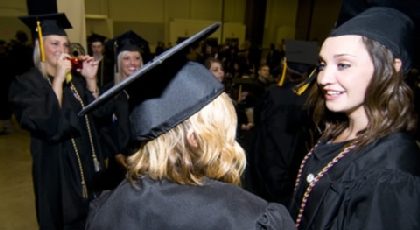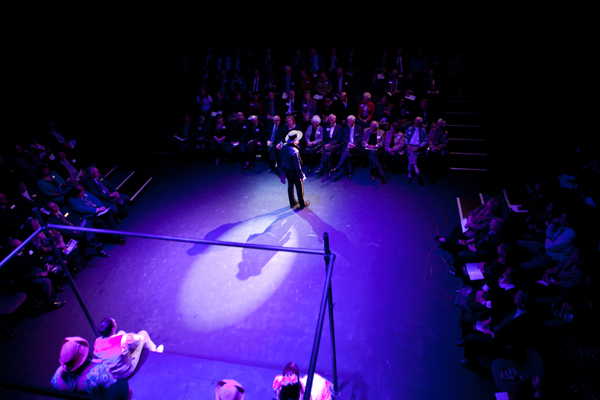Page 68 • (686 results in 0.111 seconds)
-

In their own words By Chris Albert Soon new PLU graduates will go out into the world. In the following, some Lutes share their stories of why they came to PLU, what their experiences have been and what’s the next chapter in their lives. More…
of working through difficult texts and engaging in meaningful dialogue in a way that didn’t simply lead to a definitive conclusion. Rather, they helped me develop a critical frame of reference to apply to situations outside the classroom. In the end, a standardized education produces standardized people – PLU offers a wonderful alternative. What’s next? I will be studying media philosophy at the European Graduate School in Saas Fee, Switzerland, for three years. I hope to continue on the academic
-
A year of achievement and a Decade of Change Dear Colleagues and Friends, It is a great joy for me to welcome each of you to University Fall Conference as we prepare to launch the 2010-2011 academic year, the 121st year in the life of…
priority enhancements to academic facilities and equipment, and we have continued to perform critical physical plant maintenance. ● In spite of a difficult economic environment, our fund-raising successes continued. There were more than 10,000 donors to the university last year, that’s more than any time in our history. Progress on our $100 million “Engage the World” campaign was slow in the early months of last year, but a flurry of major gifts over the past six months moved the campaign past the
-

Campaign ends, surpasses goal by $22 million A performance in the Studio Theater in Eastvold Hall, which was recently renamed the Karen Hille Phillips Center for the Performing Arts. By Greg Brewis The university’s most recent fundraising campaign was launched amid buoyant economic times, in…
Margaret Greenwood ’74 Lisa (Miles ’84) and Tim ’84 Kittilsby Lisa Kind Korsmo ’87 and John Korsmo ’84 Knut Olson ’90 and Kim Morter Olson ’88 Carol Quigg ’58 Brad ’83 and Danielle ’85 Tilden Dale and Jolita Benson (both ’63) established two endowed chairs, the Benson Family Chair in Business and Economic History and the Jolita Hylland Benson Chair in Elementary Education. The Bensons have also been major contributors to many campus projects and programs including endowed support for student
-

TACOMA, WASH. (Aug. 10, 2016)- Typically, summer allows college students to take advantage of free time that’s hard to come by during the academic year. But for many Lutes, summer is a time to work hard and continue their vocational endeavors. Students travel, work internships…
and a community member.” Dela Cruz double majored in history and literature. She also studied away for a January Term in Manchester, England, and a semester in Oaxaca, Mexico. She said she hopes to go to graduate school in a few years to study student affairs. Eventually, she hopes to work at a university in academic advising or leadership, specifically to help students of color and first-generation students. She said he is always thinking about her one wild and precious life, thanks to her time
-
Originally Published 1999 “The Artist, the thinker, the hero, the saint —who are they, finally, but the finite self radicalized and intensified? . . . The difference between [them] and the rest of us . . . is a willingness to undergo the journey of…
. Finally, my students are free. The asceticism of teaching entails respecting their freedom.While respecting the freedom of my students is prior to all else in teaching humanities, there still is much that I do to invite them into the space where the power of the humanities resides. I introduce them to the field of American religious history in the most engaging way possible, letting them see my own fascination with it. l show them issues; require them to translate material from one frame of reference
-

TACOMA, WASH. (August 10, 2015)- Each summer PLU students fan out across the globe — working, researching, studying or just plain relaxing. Many students leverage the summer months as an opportunity to add depth to their resumes by completing internships at local and corporate businesses,…
that I could stay connected with throughout the process. The HR team member in Tacoma told me that all of Nordstrom’s internship opportunities would become available at the beginning of December. When it comes to securing an internship at Nordstrom, it is important to not only introduce and present yourself as being polished and professional, but to be informed about Nordstrom, which includes their history, the culture and their values as a company. If you know what Nordstrom stands for and can
-

Associate Professor of Biology Jacob Egge works with students during a summer semester research project. (Photo by PLU Photographer John Froschauer) Faculty-Student Research Provides a Cornerstone of the PLU Mission By Pacific Lutheran University Marketing & Communications and the Office of the Provost This year’s…
distribution and evolution in fishes, 24 species representing 24 families and all four major orders of otophysan fishes were surveyed. A combination of light microscopy (LM) and scanning electron microscopy (SEM) was used to search 15 body regions for the presence of extraoral taste buds. Taste bud morphologies and distributions were then mapped onto an existing phylogeny of otophysan fishes, allowing for inferences regarding evolutionary history. Results suggest that extraoral taste buds may have evolved
-

Housing is something many of us take for granted. Much more than just a place to sleep and a structure to shelter us from the elements, our homes provide the space we need to maintain a functional life. It’s where we manage our mental health,…
systems change that offer meaningful solutions.” Brian Lloyd ’88 is a vice president at Beacon Development Group, a Seattle-based operation that provides affordable housing consulting services to nonprofits and public housing Authorities. “PLU instilled the idea that I could serve the community,” says Lloyd, who double majored in history and global studies at PLU before earning a master of public policy degree from Harvard University. “After grad school, I realized the place for my service was the
-

Two PLU professors were recently invited to teach a summer intensive course at Sichuan University, a 70,000-student public university in Chengdu, China. PLU and Sichuan have a decades-long relationship that dates back to the 1980s. PLU faculty visits took place in 2023, and in summer…
very interesting cultural experiences that we were able to enjoy, ranging from seeing the pandas to watching Chinese opera to visiting Mount Qingcheng and the Dujiangyan Irrigation System. It was fun to learn more about the history, tradition, and significance of each of these. I also appreciated the variety of food we were able to try, especially hot pot, an outing that was planned by my TA in collaboration with staff members at Sichuan University. During hot pot, my TA explained what everything
-

In January 2006, a group of PLU students — bundled up in warm coats, gloves, hats and sturdy boots — stepped carefully from the boat on which they’d been traveling onto the rocky and icy shores of Antarctica. This intrepid class helped seal a spot…
intrepid class helped seal a spot in history for PLU as the very first U.S. college to have students and professors studying on all seven continents at the same time. PLU has long been a leader in global education, and an important part of that is giving our students multiple opportunities to study in different locations — whether that’s as close as Neah Bay, Washington, or as far away as Antarctica. And students take advantage of these opportunities — over half of all students study away at least once
Do you have any feedback for us? If so, feel free to use our Feedback Form.


